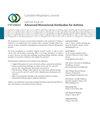Anlotinib Inhibits Cisplatin Resistance in Non-Small-Cell Lung Cancer Cells by Inhibiting MCL-1 Expression via MET/STAT3/Akt Pathway
IF 2.1
4区 医学
Q3 RESPIRATORY SYSTEM
引用次数: 0
Abstract
Background. Anlotinib is an effective targeted therapy for advanced non-small-cell lung cancer (NSCLC) and has been found to mediate chemoresistance in many cancers. However, the underlying molecular mechanism of anlotinib mediates cisplatin (DDP) resistance in NSCLC remains unclear. Methods. Cell viability was assessed by the cell counting kit 8 assay. Cell proliferation, migration, and invasion were determined using the colony formation assay and transwell assay. The mRNA expression levels of mesenchymal-epithelial transition factor (MET) and myeloid cell leukemia-1 (MCL-1) were measured by quantitative real-time PCR. Protein expression levels of MET, MCL-1, and STAT3/Akt pathway-related markers were examined using western blot analysis. Results. Our data showed that anlotinib inhibited the DDP resistance of NSCLC cells by regulating cell proliferation and metastasis. Moreover, MET and MCL-1 expression could be decreased by anlotinib treatment. Silencing of MET suppressed the activity of the STAT3/Akt pathway and MCL-1 expression. Furthermore, MET overexpression reversed the inhibitory effect of anlotinib on the DDP resistance of NSCLC cells, and this effect could be eliminated by MCL-1 knockdown or ACT001 (an inhibitor for STAT3/Akt pathway). Conclusion. Our results confirmed that anlotinib inhibited DDP resistance in NSCLC cells, which might decrease MCL-1 expression via mediating the MET/STAT3/Akt pathway.安罗替尼通过 MET/STAT3/Akt 通路抑制 MCL-1 的表达,从而抑制非小细胞肺癌细胞的顺铂耐药性
背景安罗替尼是一种治疗晚期非小细胞肺癌(NSCLC)的有效靶向药物,已被发现可介导多种癌症的化疗耐药性。然而,安罗替尼介导顺铂(DDP)在NSCLC中耐药的潜在分子机制仍不清楚。研究方法用细胞计数试剂盒 8 评估细胞活力。细胞增殖、迁移和侵袭采用集落形成试验和透孔试验进行测定。间充质-上皮转化因子(MET)和髓样细胞白血病-1(MCL-1)的 mRNA 表达水平采用实时定量 PCR 法进行测定。采用 Western 印迹分析法检测 MET、MCL-1 和 STAT3/Akt 通路相关标记物的蛋白表达水平。结果显示我们的数据显示,安罗替尼通过调节细胞增殖和转移抑制了NSCLC细胞的DDP耐药性。此外,安罗替尼可降低MET和MCL-1的表达。沉默MET可抑制STAT3/Akt通路的活性和MCL-1的表达。此外,MET过表达可逆转安罗替尼对NSCLC细胞DDP耐药性的抑制作用,而MCL-1敲除或ACT001(STAT3/Akt通路抑制剂)可消除这种作用。结论我们的研究结果证实,安罗替尼抑制NSCLC细胞的DDP耐药性,可能是通过介导MET/STAT3/Akt通路来降低MCL-1的表达。
本文章由计算机程序翻译,如有差异,请以英文原文为准。
求助全文
约1分钟内获得全文
求助全文
来源期刊

Canadian respiratory journal
医学-呼吸系统
CiteScore
4.20
自引率
0.00%
发文量
61
审稿时长
6-12 weeks
期刊介绍:
Canadian Respiratory Journal is a peer-reviewed, Open Access journal that aims to provide a multidisciplinary forum for research in all areas of respiratory medicine. The journal publishes original research articles, review articles, and clinical studies related to asthma, allergy, COPD, non-invasive ventilation, therapeutic intervention, lung cancer, airway and lung infections, as well as any other respiratory diseases.
 求助内容:
求助内容: 应助结果提醒方式:
应助结果提醒方式:


